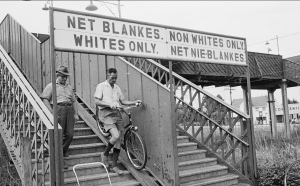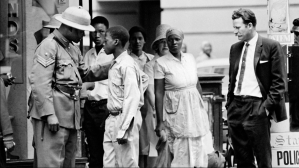EXCLUSIVE: More than 50 years after it was published, House of Bondage remains the definitive pictorial account of South Africa’s brutal and dehumanizing system of apartheid.
The volume was the work of a young Black South African photographer, Ernest Cole, who had to smuggle his images out of the country to get them into print. The Oscar-contending documentary Ernest Cole: Lost and Found, directed by renowned filmmaker Raoul Peck, reveals the man behind the camera and what Cole managed to capture about structural oppression both in South Africa and later in the United States.
The film, winner of the L’Oeil d’or prize for the best documentary at the Cannes Film Festival, opens theatrically in New York on November 22 and in Los Angeles on November 29 through Magnolia Pictures. We have your first look at the film in the trailer above.
A still photograph by Ernest Cole in ‘Ernest Cole: Lost and Found’
Magnolia Pictures
“Ernest Levi Tsoloane Kole, born in 1940 in Eersterust, Pretoria, began his career sweeping floors in a Johannesburg photography studio,” Valerie Complex writes in her Deadline review of the film. “He finally broke through when hired by famed Black outlet DRUM magazine in the late 1950s. Cole’s lens was unflinching, and his images of the oppressive apartheid state quickly made him a target for the South African government. Through his pictures, he chronicled how racism existed in every facet of daily life and how the intense subjugation forced the Black people of South Africa to learn and navigate the language of servitude.”
Forced into exile, he took up residence in New York City in the mid-1960s, “where he photographed extensively,” notes Magnolia Pictures, “as well as the American South, fascinated by the ways this country could be at times so vastly different, and at others eerily similar, to the segregated culture of his homeland. During this period, he published his landmark book of photographs denouncing the apartheid [system], House of Bondage which, while banned in South Africa, cemented Cole’s place as one of the great photographers of his time at the age of 27.”

Director Raoul Peck photographed in Deadline’s studio at the Toronto International Film Festival September 8, 2024
Michael Buckner for Deadline
Peck draws upon some of the 60,000 negatives of Cole’s work “inexplicably discovered in a bank vault in Stockholm, Sweden” after his death in 1990 (the director suspects the negatives weren’t so much “lost” as intentionally squirreled away in the bank by various entities hoping to see their monetary value increase).
“We know now what the story is,” Peck told Deadline at the Toronto Film Festival, in reference to how the images mysteriously emerged. “But I didn’t want to include it really in the film because I wanted the film to be Ernest Cole telling his story. The fact that 60,000 of his pictures and negatives were in a bank vault in Sweden ‘discovered’ quote, unquote in 2017 just says something about how the work of such an iconic photographer was respected or not. They probably thought that the family would forget about it at some time, and the work could be recuperated — as [much] African art has been along the centuries, either stolen or not returned. So, I didn’t want to make it the center of the film. For me, it was about Ernest Cole telling his own story.”

A still photograph by Ernest Cole in ‘Ernest Cole: Lost and Found’
Magnolia Pictures
Cole’s writings are brought to life by Oscar-nominated actor LaKeith Stanfield. (In Peck’s landmark documentary I Am Not Your Negro, about author James Baldwin, the director tapped Samuel L. Jackson to voice Baldwin’s letters and other work).
“I knew that I needed somebody who will not only ‘impersonate,’ but really embodied Ernest Cole, as I did for I Am Not Your Negro,” Peck told Deadline. “I needed an actor to be a character, not to play or not to narrate. LaKeith was extraordinary. His voice, his demeanor, the way he felt the words of Ernest Cole were exactly what I was looking for.”
After opening in New York and Los Angeles, Ernest Cole: Lost and Found will expand to additional U.S. cities. Following the film’s premiere at Cannes in May, it screened at festivals around the world, including TIFF, the Melbourne International Film Festival in Australia, the Busan International Film Festival in South Korea, and just last week at the Woodstock Film Festival in New York and San Francisco’s Doc Stories. It was named to DOC NYC’s list of the best documentary features of the year and will screen at that event on November 18 and 20.
Magnolia Pictures says of Ernest Cole: Lost and Found, “Telling his own story through his writings, the recollections of those closest to him, and the lens of his uncompromising work, the film is a reintroduction of a pivotal Black artist to a new generation.”
Watch the trailer for Raoul Peck’s film above.

